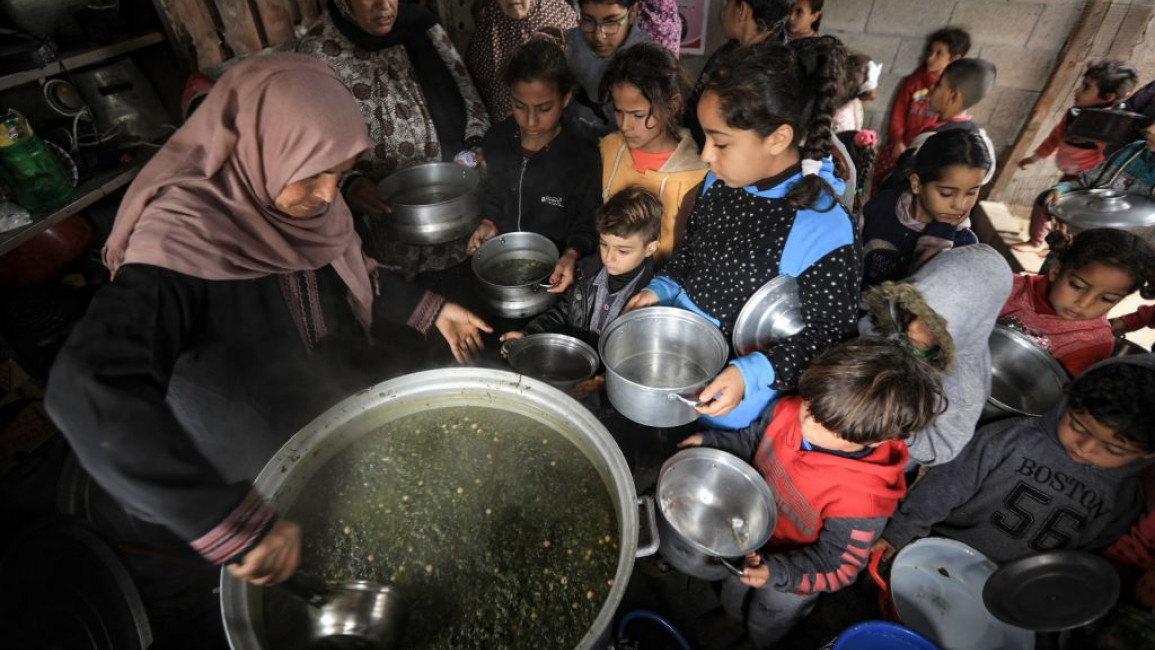
Cuts to Palestinians’ food aid remind us only justice can end their food insecurity
Despite a longstanding history of land seizures, policies that marginalised local farmers, and decreasing access to water and other resources vital for agricultural development, Palestinians have been a largely agrarian society until relatively recently, when the natural culmination of these actions have severely limited the arable land available to them.
Further, ongoing movement restrictions have made it difficult to get and maintain the equipment and resources needed for sustainable farming.
The historical notion of a population that was able to both feed its own communities while allowing for exports of locally grown foods (like oranges, olives, and grains) has all but disappeared from contemporary Palestinian life. Thus, the persistence of food insecurity of Palestinians (especially in the Gaza Strip), coupled with increasing dependence on food aid, is more than a story of a humanitarian emergency—but also one of ongoing and deliberate dispossession.
That makes the news regarding reductions in food aid for Palestinians even more painful. The same international community that created and enabled the systems that minimise Palestinian sovereignty in all areas, including in food availability, as well as developed systems to essentially ensure Palestinian dependence on food aid, is now threatening to take that aid away without doing anything to tackle the conditions that created that dependence to begin with.
''This moment should serve as a reminder that no aid program should be expected to sustain basic needs for millions of people for decades. Indeed, aid to Palestine—assuming aid could be used to do more than stave off severe humanitarian catastrophe—has failed. The sovereign Palestinian state that was supposed to eventually supplant aid dependence has not come, and is not coming.''
As an obvious example, it is estimated by UNRWA that the blockade in Gaza has led to a near tenfold increase in food aid dependency by the residents of the besieged territory since the early 2000s.
According to the World Food Programme (WFP), which has been operating in the occupied territories since 1991, 1.8 million Palestinians were food insecure in 2022. Although the WFP was only able to assist 51% of the (non-refugee) food-insecure population, by prioritising the most vulnerable, they were likely able to limit the worst outcomes for these populations.
Thus, the announcement by the WFP in May that they would have to suspend operations in the West Bank and Gaza Strip by August due to lack of funding, was met with alarm by Palestinians and the humanitarian community at large. Already, funding shortfalls forced the WFP to reduce cash assistance to Palestinian by 20% at the same time as soaring food prices increased the average cost for household food needs by 20%.
By early August, the WFP cuts were already being felt by Palestinians dependent on the aid for their next meal. “The fridge is empty,” one mother told the AP. “I can barely hold all of the stress in my heart.” While the agency is still able to support 150,000 of the neediest recipients, if they don’t receive more funding, even this crucial aid will be cut by November.
Of course, Palestine is not the only place where the WFP is making cuts. The agency has barely raised a quarter of the $20 billion it needs to fully operate, leading to cuts across the world’s most vulnerable places. But in the Palestinian territories, many of the factors leading to household food insecurity, led in large part by unemployment, are almost entirely human-made—and political. Samer Abdeljaber, the WFP country director in Palestine, argues that, “food insecurity here is a symptom of something larger.”
Indeed, aside from being a symptom of the restrictions of occupation and blockade, the failures of the Oslo Accords, and the broader settler colonialism project itself, food insecurity is also a symptom of the artificially-created fragmentation of Palestinians—even those living on the same lands.
The WFP primarily provides services to the Palestinian population in the occupied territories who are not registered as Palestinian refugees, defined by the United Nations as “persons whose normal place of residence was Palestine during the period 1 June 1946 to 15 May 1948, and who lost both home and means of livelihood as a result of the 1948 conflict,” as well as their descendants. This population, scattered within the West Bank and Gaza Strip as well as throughout Syria, Lebanon, and Jordan, is instead administered by the United Nations Relief and Works Agency (UNRWA).
UNRWA provides services like health care, education, and food to more than 2.5 million Palestinians in just the West Bank and Gaza Strip. Its mandate is only necessary because Israel and the international community have continued to neglect addressing the rights of Palestinian refugees. Yet its funding is often politicised, for example, the Trump administration entirely cut US support to the agency in 2018.
While the Biden administration reinstated part of the assistance in 2021, the top Republican lawmakers on the Senate and House foreign affairs panels are currently blocking $75 million in food aid to UNRWA. The agency has warned that by September 1, it will be unable to refill its food stores, leaving more than 1 million people without food by mid-September.
This tactic of openly using needed food aid to leverage political wants is a cynical reminder that even meagre assistance for Palestinian lives is often seen as a bargaining chip for American and Israeli priorities.
The coinciding threats to food aid from both the WFP and UNRWA pose disastrous consequences for Palestinians, including hundreds of thousands of children. This moment should serve as a reminder that no aid program should be expected to sustain basic needs for millions of people for decades. Indeed, aid to Palestine—assuming aid could be used to do more than stave off severe humanitarian catastrophe—has failed. The sovereign Palestinian state that was supposed to eventually supplant aid dependence has not come, and is not coming.
It is past time to start thinking of solutions for Palestinian food needs that are not dependent on the whims of politicians and donors, as well as the operating ability of large international organisations that show little appetite for challenging the circumstances in which they are charged to work.
Palestinian humanitarian needs, including food aid, would significantly decrease if the issues of movement restrictions, land seizure, settlement expansion, lack of political representation, and military and settler violence that have long been cited as the primary mechanisms for Palestinian aid dependence were sufficiently addressed. Indeed, Palestinians have shown a significant interest in efforts to fight for food sovereignty with some success—but these efforts are limited due to land, resource, and access restrictions. It is a reminder that no amount of money—especially insufficient and inconsistently distributed money—can replace justice.
Yara M. Asi, PhD, is an Assistant Professor of Global Health Management and Informatics at the University of Central Florida, a Visiting Scholar at the FXB Center for Health and Human Rights at Harvard University, and a US Fulbright Scholar to the West Bank.
Follow her on Twitter: @Yara_M_Asi
Have questions or comments? Email us at: editorial-english@newarab.com
Opinions expressed in this article remain those of the author and do not necessarily represent those of The New Arab, its editorial board or staff.




